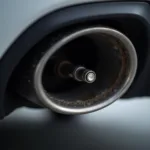You’ve modified or repaired your vehicle and are now wondering: “Do I need a vehicle modification approval inspection according to § 21 StVZO?” Don’t worry, in this article, we’ll explain everything you need to know about it.
What exactly does “Vehicle Modification Approval Inspection according to § 21 StVZO” mean?
Imagine this: You’ve given your classic car a new engine, turning it into a real powerhouse. Sounds great, right? But: Such modifications can impair road safety. That’s why there’s § 21 of the German Road Traffic Licensing Regulations (Straßenverkehrs-Zulassungs-Ordnung – StVZO). It stipulates that for certain vehicle modifications, an inspection by an officially recognized expert is necessary.
In short: A vehicle modification approval inspection according to § 21 StVZO is like an official confirmation that your modified vehicle is safe to participate in road traffic again.
When do I need such an inspection?
Not every minor change to your vehicle immediately requires an inspection. But there are some modifications and repairs where it is mandatory. These include, for example:
- Chassis modifications: Lowering, raising, different springs or shock absorbers
- Engine modifications: Performance upgrades, replacement of the engine with a different model
- Brake system modifications: Installation of larger brake discs or a different brake system
- Body modifications: Attachment of spoilers, aprons or widenings
- Conversions to motorhomes
- Repairs to safety-relevant parts: e.g., on the frame or steering
A real-life example: A customer of mine, Mr. Schmidt, had converted his VW bus into a camper. New seats, a folding bed, and a gas stove – all self-installed. He proudly presented his work to me. But: Without a vehicle modification approval inspection according to § 21 StVZO, he was not allowed to drive his converted bus on the road. Fortunately, I was able to help him and arrange an appointment with an expert.
Who performs a vehicle modification approval inspection according to § 21 StVZO?
An officially recognized expert or a testing engineer from an officially recognized inspection organization such as TÜV, Dekra, GTÜ, or KÜS is responsible for preparing the inspection report. These experts thoroughly check your vehicle and determine whether it meets the safety requirements.
How much does such an inspection cost?
The costs for a vehicle modification approval inspection according to § 21 StVZO are not fixed and vary depending on the vehicle type, the type of modification, and the complexity of the inspection. It is therefore advisable to obtain quotes from different testing centers in advance.
What should I pay attention to with a vehicle modification approval inspection according to § 21 StVZO?
- Make sure that the expert or testing engineer is officially recognized.
- Have the costs for the inspection confirmed in writing in advance.
- Ask what documents you need to bring to the appointment.
Tip: “Well-documented modifications make the expert’s job easier and can save you time and money,” says Michael Bauer, a testing engineer at Dekra. “Therefore, keep all invoices and installation instructions carefully.”
What happens if I drive without an inspection?
Anyone who participates in road traffic with a vehicle without the required operating permit risks a fine, points in Flensburg (Germany’s penalty points system), and in the worst case, even the loss of insurance coverage.
Conclusion: Safety comes first
A vehicle modification approval inspection according to § 21 StVZO may seem annoying at first glance. But it serves your own safety and the safety of all road users. This way, you can make the roads unsafe without worry and with a clear conscience.
Do you have any further questions about vehicle repair and maintenance?
Visit our website autorepairaid.com. There you will find more helpful articles, instructions, and tips all about cars. Our automotive experts are happy to answer your questions.

